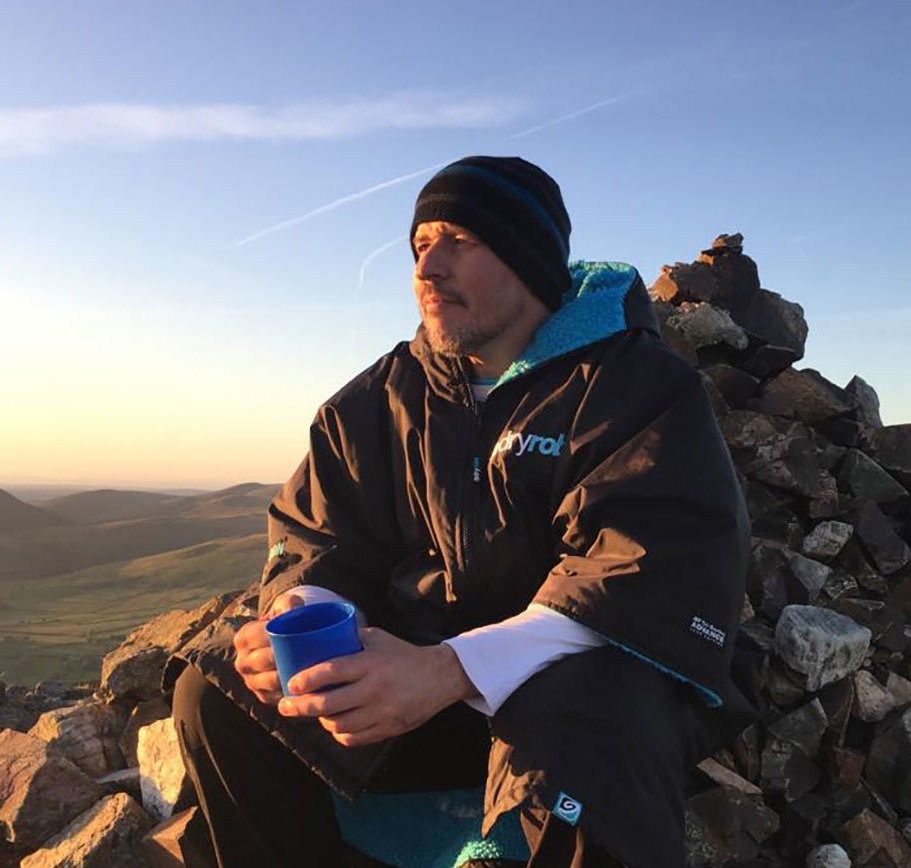Drop The Rope - Overcoming Mental Health Crisis In Policing
Posted on 23rd June 2021 at 09:00
Gareth Keyte (Retired Detective Inspector) stares his experience of the descent into Mental Ill Health due to Occupational Stress and PTSD, and how he climbed out of that deep dark hole.
As a young boy, my parents like many couples of their generation worked long hours and had several jobs in order to make ends meet. Despite money being tight, my brother and I always had clothes on our backs and food in our bellies. Mum and Dad would share with us stories about the sacrifices they and many other people make for their families. My values were imprinted during this period and fuelled a desire to build an independent future for myself outside of the small Welsh town where we lived.
At 19 I left home to join the Royal Marines where I would spend the next few years experiencing the world through the eyes of a young soldier helping others. As I broadened my life skills and knowledge of the world, my values shifted as I learned more about physical and mental resilience, loyalty, compassion and comradery.
At 24 I changed my career path to join West Mercia Police and a few years later I was married with two young children. I worked long hours on a varied shift pattern missing bedtimes, school plays, and other pivotal moments in my young family’s life. I accepted the challenges and sacrifices of the job working long hours, cancelled holidays and rest days while many of my friends and the rest of the country were spending time with their loved ones.
As a parent, I was always proud of my job and I shared stories with my two young children of all the exciting jobs I would get involved in. I took pride in telling them how I, just like every other cop, soldier, nurse or firefighter was helping to make a difference to people’s lives. By shielding them from the horrific trauma and emotions of the job and only focussing on the positives it was my hope that they would grow up to understand why I was prepared to put myself in harm’s way and work so hard to help others. I have found that this is a familiar story and even though I was working a lot, I still felt I was a good role model.
An accident involving a close family member put my career into clear perspective – at least for a short time. I had been spending far too much time at work, not enough time with my family and not being compassionate to myself. So I took some much-needed time off to recharge and recover, but it didn’t take more than a few months for me to be back in the thick of it working long hours again. I really didn’t feel that there was any other option for me.
By my late 30’s I had been promoted to Sergeant and then Inspector and I had experienced more trauma, emotional pain and conflict than the average person would experience in a lifetime. I began to feel that the good we were doing was being outweighed by the bad things we experienced. I began to notice the increasing number of robust and resilient colleagues that were working themselves into the ground. Some colleagues experienced financial pressures, some lost focus on taking care of themselves through poor diet, excessive drinking or exercising less using the shift pattern as an excuse. For many of the men and women I worked with, the strain they were under had led to declining mental health affecting the quality of their relationships at home and at work.
I was different, or so I thought. I would tell myself that I was the luckiest man in the world in terms of my job and my family, that being a cop was not only an honest and noble job but it is as fulfilling and exciting as it is painful and all-consuming. As a former Marine, I prided myself on needing very little sleep to function and that I could deal with anything life or the job could throw at me. After all, ‘This was the job’ and I got on with maintaining that perspective until the last few years of my service. After 20 years, I experienced a perfect storm of stress and pressure on top of the daily challenges of the job included supporting a broken and suicidal colleague, getting divorced and taking a stand against a bullying senior officer.
I had never shied away from challenging inappropriate behaviour at work, especially when I became a manager and leader. However, professionally calling-out a senior officer was a whole different ball game and it came with an unprecedented level of stress and anxiety. Even though I had now added to my existing pressures of being an Inspector and SIO, I refused to allow personal ambition to corrupt my integrity and I stood my ground. I was singled-out by the officer who attempted to professionally undermine me over several years despite me submitting grievance and misconduct actions against them in an attempt to get the support of the organisation. I didn’t feel supported at all! Quite the opposite in fact. I felt under attack and ever-vigilant; looking over my shoulder professionally while trying to remain focused on doing my job to the best of my ability. Relationships inside and outside of the workplace were becoming affected and my ability to effectively process information was deteriorating along with my mental health.
I had always prided myself with the compassion and emotional intelligence to spot the signs of occupational stress and anxiety in others, however I couldn’t see that I too was losing my footing and starting to slip into a deep dark hole. As I felt more and more betrayed and isolated by the organisation that I loved and had given most of my adult life to, the symptoms became more and more intense. I can only describe the experience as like being in a lonely tug-of-war with a powerful opponent. But instead of loosening my grip on the rope, I was using all of my energy to hold my ground as they repeatedly pulled my towards the hole that was swallowing up others. Eventually, my mind and body couldn’t take any more and I fell hard!
Like many police officers, soldiers and others in public service, I had been naïve to the emotional and psychological effects of the bad stuff I had experienced during my career. The biggest impact for me, was the effect on my colleagues. I saw some die before they reached retirement and others not so long after. Some lost their jobs, marriages, health, friendships and relationships with their closest family members because they allowed the demands of the job to negatively influence their life.
I honestly believed that the values that motivated me to join the Police aged 24, still held true for me when I was in my early 40s. Looking back though, I was naïve to take pride in my ability to endure physical and mental suffering. For whatever reason, I had maintained the belief that making critical decisions on little or no sleep was ‘just part of the job’ and gave me professional credibility. I believed that becoming emotionally desensitised was normal and sustainable…. I was so misguided! Sadly, after 20 years of policing, and being off work for 12 months with an unseen illness (PTSD and GAD), I was diagnosed and retired early.
The road to recovery can be long, but I am fortunate to have an amazing family, a few great colleagues and the support of the Police Federation to get me through the worst of it. These people kept me functioning and the job provided therapy to allow me to make sense of what was happening to me. Before I retired, therapists treated the symptoms and allowed me to take a compassionate approach to the most important person in the healing process; me!
Like many others in policing and the wider workplace, I am not sure what needs to change to stem the tide of declining mental health. Clearly what’s happening now isn’t working! Treating the symptoms, not the cause, is very much like closing the stable door after the horse has bolted. A recent Freedom of Information request shows that the Pre-COVID number of working days lost due to psychological illness across the 43 police forces in the UK was over 550,000. That’s an average of over 12,500 working days lost in each force. The cost analysis has been done! It’s huge!
My biggest breakthrough though since leaving, was discovering NLP coaching with a retired police officer who understood the traumas associated with the job. A few coaching sessions later, I had released the negative emotions (anger, sadness, fear, hurt, guilt and shame) that were occupying my thoughts, distracting me and keeping me awake at night. Coaching helped me resolve the internal conflicts that were negatively influencing my decision-making and behaviour. I learnt effective goal setting and how to maintain focus to overcome my beliefs that were limiting my potential to be successful. I still have a way to go, but my recovery has been made so much easier and I only wish I had discovered coaching while I was still serving. If I’d have had this level of knowledge earlier in my career, I really do believe that my experiences would have been very different and I may have remained in the job I loved so much.
What I realise now, is that by understanding the nature of the emotional and psychological challenges in policing and how they affect relationships and mental health, my experiences will not be wasted. I have restored balance to my life and I now have healthy relationships with the people and things that are most important to me.
I have retrained as Mental Health and Wellbeing coach and I have started my own business - Oxygen Coaching Company, offering personal coaching and rural coaching retreats for those experiencing occupational stress. This allows me to provide authentic coaching to a group of people that I care deeply about and to provide pro-active support in reducing occupational stress and long-term sickness.
For those of you who are tightly gripping a rope of your own…. don’t wait until you get pulled into the deep dark hole. You have a duty to be compassionate and kind to yourself as well as to others.
When I went to my first counselling session, broken and scared, Tracy (a Dr of Psychology) set me a task. “Have you heard of the Latin phrase ‘Delapsus Resurgam’? Go home and look it up. I think it will make sense to you”.
….it may just make sense to you too.
Tagged as: blue light peer support
Share this post:




